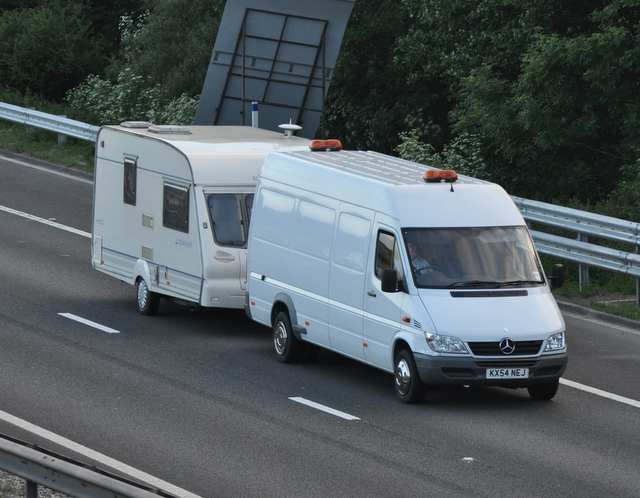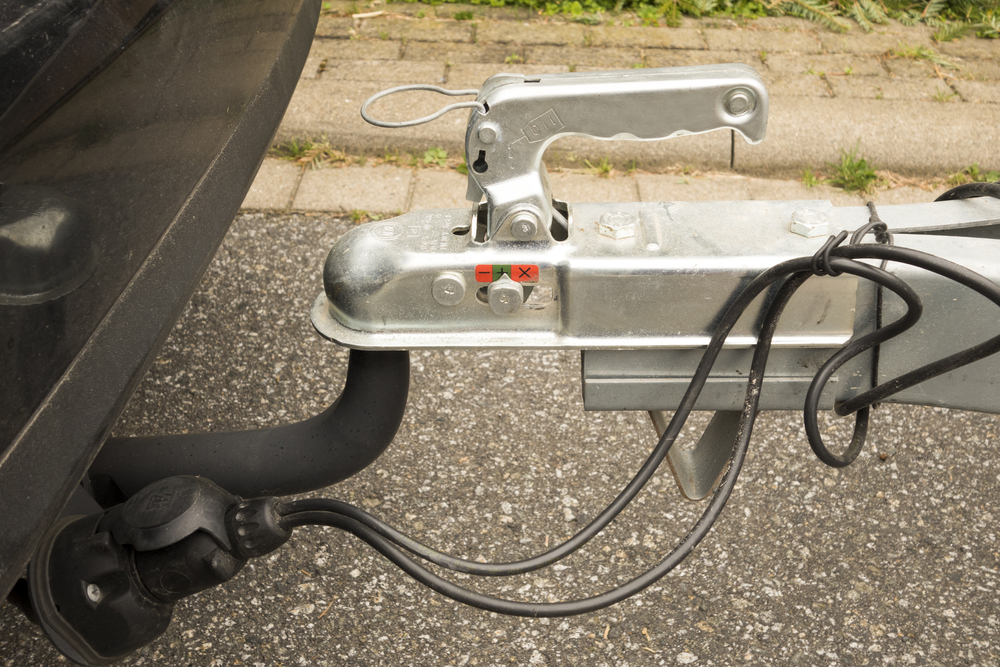May 17, 2019 at 3:46 PM
Using your van to tow a caravan or trailer comes with a fresh set of regulations you need to follow. Whether you're towing a trailer full of work tools, a caravan for a family holiday or a horsebox, you need to be aware of the towing laws in the UK and what your driving licence entitles you to drive.
Towing Laws
Despite being relatively simple to follow, it's suspected that a sizable number of UK drivers regularly break towing laws by towing a trailer or caravan that isn't permitted on their licence.
DRIVING LICENCE: WHAT CAN I LEGALLY TOW?
Needless to say, you need a full driving licence to be able to tow a trailer of any kind.
Drivers who passed their test after 19th January 2013
After the third EU directive came into force, drivers passing a category B test can legally tow:
- Small trailers weighing no more than 750kg
- A trailer over 750kg as long as the combined Gross Vehicle Weight (GVW) of the trailer and towing vehicle is no more than 3,500kg
In order to legally tow a trailer weighing more than 750kg when the combined GVW of the trailer and towing vehicle is more than 3,500kg, you'll have to add the B+E category to your licence by passing an additional test.
Drivers who passed their test after 1st January 1997 but before 19th January 2013
After the second EU directive came into force, drivers passing a category B test can legally:
- Drive a vehicle up to 3,500kg GVW and tow a trailer with a GVW up to 750kg
- Tow a trailer over 750kg GVW as long as the combined weight of the trailer and towing vehicle is no more than 3,500kg
In order to legally drive and tow anything heavier than 4,250kg, you'll have to add the B+E category to your licence by passing an additional test.
Drivers who passed their test before 1st January 1997
Generally, drivers passing a category B test can legally drive a vehicle and trailer combination up to 8,250kg because the B+E category will already be added to your license.
To check the categories you have on your licence, you can look at the back of your pink licence card or use the government website. If you're caught towing a trailer or caravan beyond the categories on your licence, you could receive a fine up to £1,000 and three to six points on your licence.
You can upgrade your licence by taking the B+E test which costs £115 if you take it during the normal working week or £141 for a test in the evening, on a weekend or on a bank holiday.

TOWING CAPACITY & VEHICLE WEIGHTS
When towing a trailer or a caravan, it's vitally important you know the individual and combined weights of the towing vehicle and the trailer. If you exceed the limits on your licence you're breaking the law.
Before you can successfully work out the towing capacity of your vehicle, you need to understand a few technical terms:
- Unladen Weight: The weight of the vehicle when it's not carrying any passengers, goods or other items. Also known as kerb weight
- Payload: The maximum weight of the load that can be carried on a vehicle. Calculated by Gross Vehicle Weight minus unladen weight
- Gross Vehicle Weight (GVW): Maximum weight the vehicle or trailer is allowed to be when fully loaded. Also known as Maximum Authorised Mass (MAM). Calculated by unladen weight plus payload
- Gross Combination Weight (GCW): Maximum Gross Vehicle Weight of the towing vehicle and trailer combined. Also known as Gross Train Weight (GTW)
You can find these important figures on the chassis plate of the towing vehicle and trailer; typically this is located on one of the door sills or near the door frame. Alternatively, the information is sometimes on the vehicle's V5C (log book) or in the owner's manual.
NOTE: If you find the weight limits in the owner's manual, you need to make sure you're looking at the specific numbers relevant to your exact model - towing weights can significantly vary depending on the engine and gearbox configurations.
How to work out towing capacity
The towing capacity is the maximum weight a vehicle can tow safely and legally. Working out your vehicle's towing capacity uses a simple calculation: Gross Combination Weight minus Gross Vehicle Weight.
For example, if you had a vehicle with a GCW of 4,235kg and a GVW of 2,235kg, the towing capacity would be 2,000kg.
If the Maximum Authorised Mass of the trailer or caravan is 85% or less of the towing vehicle's unladen weight, you will be able to tow with ease. Anything between 85% and 100% is more dangerous and should only be undertaken by experienced towers. If the trailer or caravan is heavier than the towing vehicle, you need a different towing vehicle with a higher towing capacity.
Does your trailer need brakes?
Yes, if it's over a certain weight. Trailers with a GVW of 750kg or less don't need to have independent brakes. Any trailer with a GVW of 751kg and over are legally required to be fitted with brakes of their own - they're commonly known as braked trailers.
TOWING FOR BUSINESS
If you use your business vehicle - usually a van or pick-up truck - to tow a trailer, you might have to adhere to some additional rules depending on the weight of your van and trailer.
Do you need a tachograph?
A tachograph is a device that's fitted to a vehicle to record its speed and distance covered as well as the amount of time the driver has spent behind the wheel. They're usually associated with larger vehicles such as lorries and buses.
However, companies are legally obliged to fit a tachograph if their business vehicle weighs more than 3,500kg on its own or when towing a trailer. For example, there are certain large vans with a GVW of 3,500kg (e.g. Mercedes Sprinter) which would need a tachograph fitted as soon as any kind of trailer is attached.
You do not need a tachograph if the Gross Train Weight (GTW) is less than 3,500kg. Similarly, if you're making a personal journey - for example, towing a horsebox at the weekend - and the GTW is below 7,500kg, you don't need a tachograph (but you do need an appropriate licence).
A business is also exempt from fitting a tachograph if the GTW of the van and trailer is carrying materials, equipment or machinery for the driver's work that doesn't exceed 7,500kg and they don't travel more than 62 miles from the radius of the van's base.

Does the driver need an O-licence?
If a van or pick-up truck has a tachograph fitted, the driver must have an O-licence (Operator licence). The driver may also be subject to the driver's hours regulations.
For more information about the O-licence, you can read the government's guide and apply for one online.
TRAILER SIZE & LOADING
The size of trailer you can tow depends on the weight of the towing vehicle. If it has a GVW of 3,500kg or less, the trailer must be a maximum of 7m long by 2.55m wide. The only exception to the 7m limit is when you're towing a trailer that has been specifically designed to carry long, slender loads (e.g. boats or gliders).
Although the trailer is restricted to 7m long, you can technically have items poking out the back of the trailer. However, the cargo shouldn't overhang by more than 3.05m. It needs to be visible at night and safely secured at all times.
A heavier towing vehicle is allowed to pull a trailer up to 12m long by 2.55m wide. In order to drive this heavier vehicle, you'll need the B+E category on your licence.
How to correctly load your trailer
When it comes to loading your trailer, the same rules apply as arranging cargo in the back of a van. Make sure that the load is evenly distributed and does not exceed the payload capacity.
If you're towing a heavy item or several heavy objects, make sure to load over the wheels of the trailer and not at one end or the other. Sometimes the trailer's chassis plate will display the maximum axle weights which mustn't be exceeded.
Where possible, ensure the load doesn't overhang the trailer and that everything is secure by using straps to tie the load down - if you're forced to brake suddenly, think about the items that might move about.
COUPLING A TRAILER
Before you set off on any journey, it's important to check that the trailer has been correctly coupled to the towing vehicle. As a back-up, you should use a breakaway cable or secondary coupling.
When you're checking the connection, you should also ensure that the trailer's tow bar is level and not pointing up or down. If it's not level, it's a common sign that the load is unbalanced.

Tips For Towing A Trailer Or Caravan With A Van
Although towing a trailer isn't too difficult most of the time, it makes your van handle differently, especially if you're near the towing capacity. There are some important things you need to remember before setting off:
- The trailer must display the same number plate as your van which needs to be unobscured and properly lit
- The van's rear light panel must be visible. If not, the trailer needs to have: two red sidelights, two red brake lights, amber indicators and a pair of red triangular reflectors at the back
- If the trailer is wider than the van, towing mirrors need to be fitted
- Towbars must be 'type approved' by meeting EU regulations and designed for your van
When you're on the road you should give yourself more time and space for everything, especially braking and taking corners. The speed limits while towing in a van don't change - you're still limited to 60mph on dual carriageways and 50mph on single carriage roads.
If, for any reason, the trailer starts to swerve, don't adjust the direction of the van to try and correct it. Simply slow down because this type of movement suggests you're travelling too quickly.

